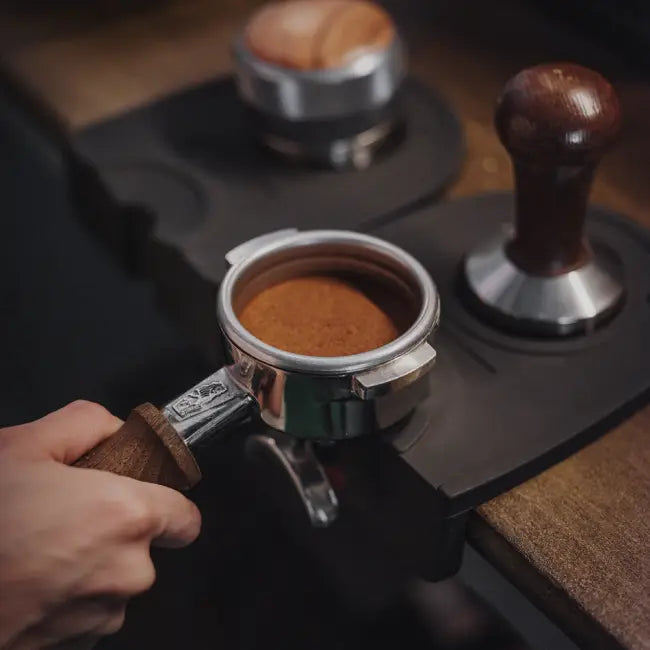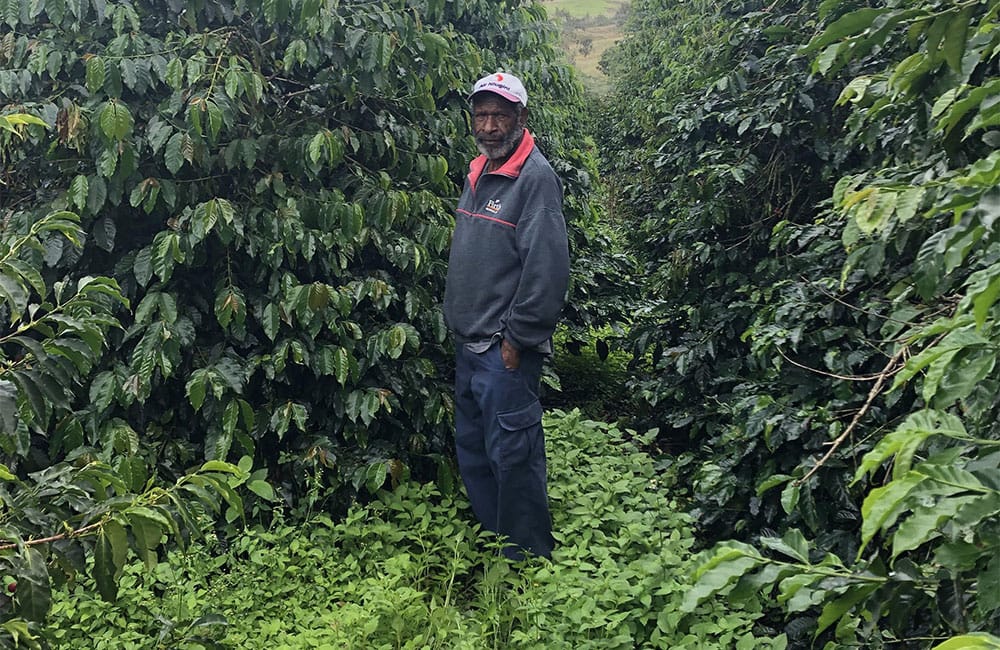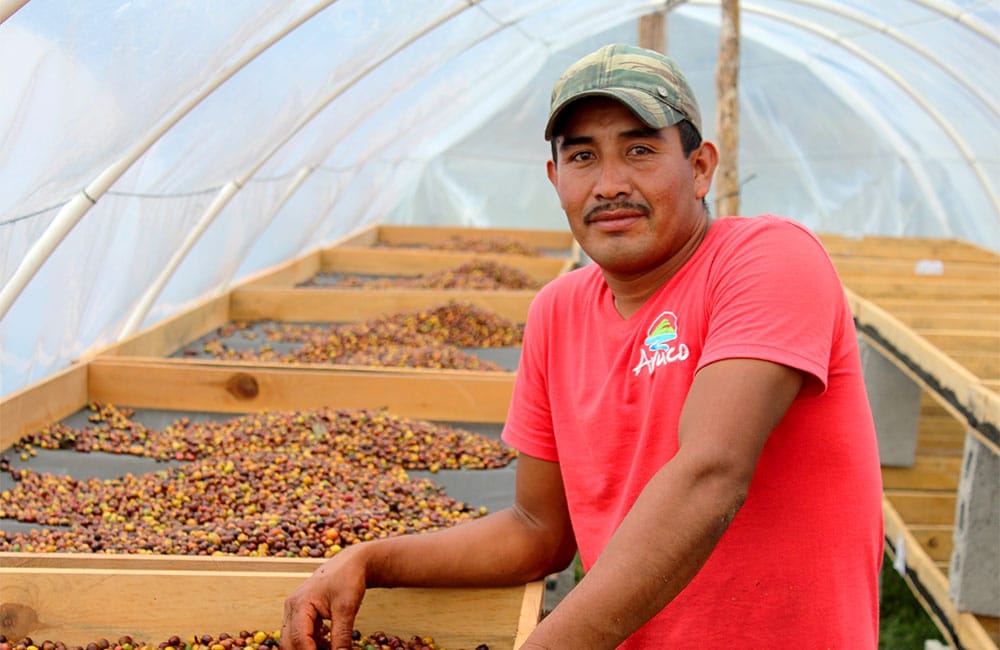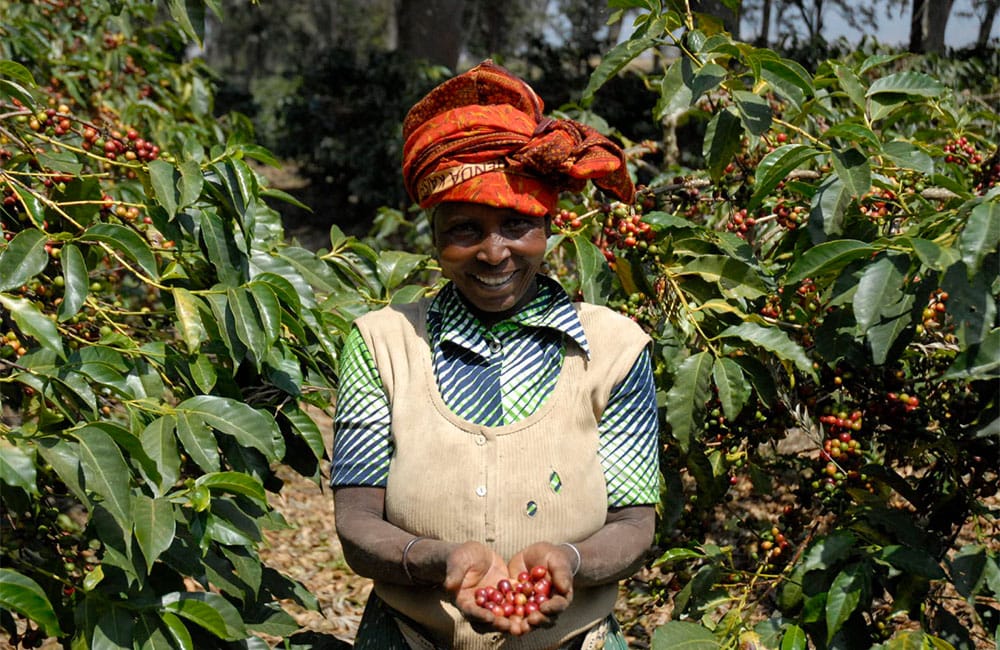Filtro & Espresso
Fruta de la pasión, té negro, papaya
Papúa Nueva Guinea |
|
1.700 - 1.850 msnm. |
|
Arusha, Bourbon |
|
Lavado |
|
Familia Colbran |

Finca Baroida. Café de especialidad de Papúa Nueva Guinea
Situada en la provincia de Eastern Highlands, Finca Baroida produce consistentemente algunos de los cafés de más alta calidad de Papúa Nueva Guinea.
Gracias a una meticulosa separación de las cerezas en el control de calidad, este café brilla con una gran acidez, buen cuerpo y rico dulzor en boca.
Acerca de este café
Finca Baroida se encuentra en el distrito de Kainantu, provincia de Eastern Highlands.
La finca fue fundada por Ben Colbran en la década de 1960 cuando el gobierno invitó a agricultores extranjeros a cultivar las tierras en los Eastern Highlands.
Ben Colbran comenzó por comprar la tierra a un nativo llamado Taro y fue uno de los primeros agricultores en cultivar café en estos valles. Hoy, el hijo de Ben, Nicol, dirige la finca.
 El café de Biftu Gudina es procesado usando el método lavado. Una vez en la estación de lavado, los frutos son clasificados a mano y se descartan los frutos inmaduros o excesivamente maduros antes de pasarlos por la máquina despulpadora ‘eco-pulper’ Penagos (esta máquina ayuda a reducir el uso de agua excesivo). A continuación, los granos se dejan en remojo durante unas 8 horas. El tratamiento de aguas residuales de la cooperativa se basa en una forma natural de filtración a través de una parcela de pasto vetiver antes de pasar por los pozos y finalmente a la tierra. A continuación, los granos se secan al sol durante 10 a 14 días en camas africanas elevadas y se vuelven a clasificar cuidadosamente a mano.El nombre "Baroida" proviene del espíritu de Baroida, que los lugareños creen que reside en una gran roca que se encuentra en uno de los principales ríos que fluyen a través de la finca.
El café de Biftu Gudina es procesado usando el método lavado. Una vez en la estación de lavado, los frutos son clasificados a mano y se descartan los frutos inmaduros o excesivamente maduros antes de pasarlos por la máquina despulpadora ‘eco-pulper’ Penagos (esta máquina ayuda a reducir el uso de agua excesivo). A continuación, los granos se dejan en remojo durante unas 8 horas. El tratamiento de aguas residuales de la cooperativa se basa en una forma natural de filtración a través de una parcela de pasto vetiver antes de pasar por los pozos y finalmente a la tierra. A continuación, los granos se secan al sol durante 10 a 14 días en camas africanas elevadas y se vuelven a clasificar cuidadosamente a mano.El nombre "Baroida" proviene del espíritu de Baroida, que los lugareños creen que reside en una gran roca que se encuentra en uno de los principales ríos que fluyen a través de la finca.Esta roca en particular, ha permanecido obstinadamente en medio del río desde que todos pueden recordar, negándose a moverse incluso tras las inundaciones más severas, cuando otras rocas han sido fácilmente arrastradas por la corriente.
La plantación de Baroida se encuentra en el vértice del valle del río Lamari y la cordillera del Monte Jabarra.
La finca en sí se encuentra a unos 1.691 metros sobre el nivel del mar entre miles de hectáreas de tierra con antiguas fincas coloniales que las rodean (ahora administradas por terratenientes nativos) y flanqueadas por montañas llenas de pequeños productores de café que cultivan cerca de un millón de árboles.
 El café de Biftu Gudina es procesado usando el método lavado. Una vez en la estación de lavado, los frutos son clasificados a mano y se descartan los frutos inmaduros o excesivamente maduros antes de pasarlos por la máquina despulpadora ‘eco-pulper’ Penagos (esta máquina ayuda a reducir el uso de agua excesivo). A continuación, los granos se dejan en remojo durante unas 8 horas. El tratamiento de aguas residuales de la cooperativa se basa en una forma natural de filtración a través de una parcela de pasto vetiver antes de pasar por los pozos y finalmente a la tierra. A continuación, los granos se secan al sol durante 10 a 14 días en camas africanas elevadas y se vuelven a clasificar cuidadosamente a mano.
El café de Biftu Gudina es procesado usando el método lavado. Una vez en la estación de lavado, los frutos son clasificados a mano y se descartan los frutos inmaduros o excesivamente maduros antes de pasarlos por la máquina despulpadora ‘eco-pulper’ Penagos (esta máquina ayuda a reducir el uso de agua excesivo). A continuación, los granos se dejan en remojo durante unas 8 horas. El tratamiento de aguas residuales de la cooperativa se basa en una forma natural de filtración a través de una parcela de pasto vetiver antes de pasar por los pozos y finalmente a la tierra. A continuación, los granos se secan al sol durante 10 a 14 días en camas africanas elevadas y se vuelven a clasificar cuidadosamente a mano.El cultivo
Uno de los mayores desafíos al que se enfrentaron los Colbran cuando comenzaron fue por un problema de anegamiento del suelo. El sistema que generalmente se utiliza para las plántulas de café en Papúa Nueva Guinea fue adaptado de Kenia.
Al plantar una nueva plántula, se cava un hoyo de aproximadamente un metro de ancho por un metro de profundidad, se llena con tierra vegetal y se introduce la plántula en él.
 El café de Biftu Gudina es procesado usando el método lavado. Una vez en la estación de lavado, los frutos son clasificados a mano y se descartan los frutos inmaduros o excesivamente maduros antes de pasarlos por la máquina despulpadora ‘eco-pulper’ Penagos (esta máquina ayuda a reducir el uso de agua excesivo). A continuación, los granos se dejan en remojo durante unas 8 horas. El tratamiento de aguas residuales de la cooperativa se basa en una forma natural de filtración a través de una parcela de pasto vetiver antes de pasar por los pozos y finalmente a la tierra. A continuación, los granos se secan al sol durante 10 a 14 días en camas africanas elevadas y se vuelven a clasificar cuidadosamente a mano.Este método resultó ser completamente inadecuado para las húmedas tierras de PNG, donde la precipitación anual promedio es de 90 pulgadas (a diferencia de las 60 pulgadas de Kenia).
El café de Biftu Gudina es procesado usando el método lavado. Una vez en la estación de lavado, los frutos son clasificados a mano y se descartan los frutos inmaduros o excesivamente maduros antes de pasarlos por la máquina despulpadora ‘eco-pulper’ Penagos (esta máquina ayuda a reducir el uso de agua excesivo). A continuación, los granos se dejan en remojo durante unas 8 horas. El tratamiento de aguas residuales de la cooperativa se basa en una forma natural de filtración a través de una parcela de pasto vetiver antes de pasar por los pozos y finalmente a la tierra. A continuación, los granos se secan al sol durante 10 a 14 días en camas africanas elevadas y se vuelven a clasificar cuidadosamente a mano.Este método resultó ser completamente inadecuado para las húmedas tierras de PNG, donde la precipitación anual promedio es de 90 pulgadas (a diferencia de las 60 pulgadas de Kenia).A pesar de esto, resolvieron el problema cavando zanjas de drenaje entre cada fila de café. Con el tiempo, Ben se volvió muy bueno "leyendo" las necesidades de las plantas de café (es decir, cuando necesitaban ciertos fertilizantes o si el café estaba enfermo, etc).
 El café de Biftu Gudina es procesado usando el método lavado. Una vez en la estación de lavado, los frutos son clasificados a mano y se descartan los frutos inmaduros o excesivamente maduros antes de pasarlos por la máquina despulpadora ‘eco-pulper’ Penagos (esta máquina ayuda a reducir el uso de agua excesivo). A continuación, los granos se dejan en remojo durante unas 8 horas. El tratamiento de aguas residuales de la cooperativa se basa en una forma natural de filtración a través de una parcela de pasto vetiver antes de pasar por los pozos y finalmente a la tierra. A continuación, los granos se secan al sol durante 10 a 14 días en camas africanas elevadas y se vuelven a clasificar cuidadosamente a mano.Con el tiempo y experiencia fueron incrementando en estos conocimientos y técnicas las cuales fueron transmitidas a Nicol, que las continúa implementando en la actualidad.
El café de Biftu Gudina es procesado usando el método lavado. Una vez en la estación de lavado, los frutos son clasificados a mano y se descartan los frutos inmaduros o excesivamente maduros antes de pasarlos por la máquina despulpadora ‘eco-pulper’ Penagos (esta máquina ayuda a reducir el uso de agua excesivo). A continuación, los granos se dejan en remojo durante unas 8 horas. El tratamiento de aguas residuales de la cooperativa se basa en una forma natural de filtración a través de una parcela de pasto vetiver antes de pasar por los pozos y finalmente a la tierra. A continuación, los granos se secan al sol durante 10 a 14 días en camas africanas elevadas y se vuelven a clasificar cuidadosamente a mano.Con el tiempo y experiencia fueron incrementando en estos conocimientos y técnicas las cuales fueron transmitidas a Nicol, que las continúa implementando en la actualidad.Se han ido realizando algunos ajustes menores a lo largo de los años y a medida que la finca y producción han crecido en tamaño.
Se han plantado más árboles de sombra para reducir la necesidad de fertilizantes y mantener las malas hierbas bajo control.
 El café de Biftu Gudina es procesado usando el método lavado. Una vez en la estación de lavado, los frutos son clasificados a mano y se descartan los frutos inmaduros o excesivamente maduros antes de pasarlos por la máquina despulpadora ‘eco-pulper’ Penagos (esta máquina ayuda a reducir el uso de agua excesivo). A continuación, los granos se dejan en remojo durante unas 8 horas. El tratamiento de aguas residuales de la cooperativa se basa en una forma natural de filtración a través de una parcela de pasto vetiver antes de pasar por los pozos y finalmente a la tierra. A continuación, los granos se secan al sol durante 10 a 14 días en camas africanas elevadas y se vuelven a clasificar cuidadosamente a mano.Como consecuencia, con más sombra se obtienen rendimientos más bajos.
El café de Biftu Gudina es procesado usando el método lavado. Una vez en la estación de lavado, los frutos son clasificados a mano y se descartan los frutos inmaduros o excesivamente maduros antes de pasarlos por la máquina despulpadora ‘eco-pulper’ Penagos (esta máquina ayuda a reducir el uso de agua excesivo). A continuación, los granos se dejan en remojo durante unas 8 horas. El tratamiento de aguas residuales de la cooperativa se basa en una forma natural de filtración a través de una parcela de pasto vetiver antes de pasar por los pozos y finalmente a la tierra. A continuación, los granos se secan al sol durante 10 a 14 días en camas africanas elevadas y se vuelven a clasificar cuidadosamente a mano.Como consecuencia, con más sombra se obtienen rendimientos más bajos.Por ello, los Colbran han implementado programas de renovación y plantación para poder atender la futura demanda.
No obstante, según Nicol, la alta calidad de sus cafés se debe, en parte, a los sistemas "anticuados" que llevan en funcionamiento desde finales de los años 60.
 El café de Biftu Gudina es procesado usando el método lavado. Una vez en la estación de lavado, los frutos son clasificados a mano y se descartan los frutos inmaduros o excesivamente maduros antes de pasarlos por la máquina despulpadora ‘eco-pulper’ Penagos (esta máquina ayuda a reducir el uso de agua excesivo). A continuación, los granos se dejan en remojo durante unas 8 horas. El tratamiento de aguas residuales de la cooperativa se basa en una forma natural de filtración a través de una parcela de pasto vetiver antes de pasar por los pozos y finalmente a la tierra. A continuación, los granos se secan al sol durante 10 a 14 días en camas africanas elevadas y se vuelven a clasificar cuidadosamente a mano.
El café de Biftu Gudina es procesado usando el método lavado. Una vez en la estación de lavado, los frutos son clasificados a mano y se descartan los frutos inmaduros o excesivamente maduros antes de pasarlos por la máquina despulpadora ‘eco-pulper’ Penagos (esta máquina ayuda a reducir el uso de agua excesivo). A continuación, los granos se dejan en remojo durante unas 8 horas. El tratamiento de aguas residuales de la cooperativa se basa en una forma natural de filtración a través de una parcela de pasto vetiver antes de pasar por los pozos y finalmente a la tierra. A continuación, los granos se secan al sol durante 10 a 14 días en camas africanas elevadas y se vuelven a clasificar cuidadosamente a mano.Cosecha y poscosecha
Una meticulosa separación y clasificación de las cerezas es clave para mantener la alta calidad del café.
Después de una cuidadosa selección, la cereza se despulpa.
A continuación, se fermenta en seco en tanques durante aproximadamente 36 horas.
 El café de Biftu Gudina es procesado usando el método lavado. Una vez en la estación de lavado, los frutos son clasificados a mano y se descartan los frutos inmaduros o excesivamente maduros antes de pasarlos por la máquina despulpadora ‘eco-pulper’ Penagos (esta máquina ayuda a reducir el uso de agua excesivo). A continuación, los granos se dejan en remojo durante unas 8 horas. El tratamiento de aguas residuales de la cooperativa se basa en una forma natural de filtración a través de una parcela de pasto vetiver antes de pasar por los pozos y finalmente a la tierra. A continuación, los granos se secan al sol durante 10 a 14 días en camas africanas elevadas y se vuelven a clasificar cuidadosamente a mano.Para detener el proceso de fermentación se añade agua a los tanques con un movimiento circular agitando el café de forma natural para eliminar cualquier resto de mucílago.
El café de Biftu Gudina es procesado usando el método lavado. Una vez en la estación de lavado, los frutos son clasificados a mano y se descartan los frutos inmaduros o excesivamente maduros antes de pasarlos por la máquina despulpadora ‘eco-pulper’ Penagos (esta máquina ayuda a reducir el uso de agua excesivo). A continuación, los granos se dejan en remojo durante unas 8 horas. El tratamiento de aguas residuales de la cooperativa se basa en una forma natural de filtración a través de una parcela de pasto vetiver antes de pasar por los pozos y finalmente a la tierra. A continuación, los granos se secan al sol durante 10 a 14 días en camas africanas elevadas y se vuelven a clasificar cuidadosamente a mano.Para detener el proceso de fermentación se añade agua a los tanques con un movimiento circular agitando el café de forma natural para eliminar cualquier resto de mucílago.Luego, el café se deja secar al sol sobre lonas, donde se remueve con regularidad para asegurar un secado uniforme.
 El café de Biftu Gudina es procesado usando el método lavado. Una vez en la estación de lavado, los frutos son clasificados a mano y se descartan los frutos inmaduros o excesivamente maduros antes de pasarlos por la máquina despulpadora ‘eco-pulper’ Penagos (esta máquina ayuda a reducir el uso de agua excesivo). A continuación, los granos se dejan en remojo durante unas 8 horas. El tratamiento de aguas residuales de la cooperativa se basa en una forma natural de filtración a través de una parcela de pasto vetiver antes de pasar por los pozos y finalmente a la tierra. A continuación, los granos se secan al sol durante 10 a 14 días en camas africanas elevadas y se vuelven a clasificar cuidadosamente a mano.
El café de Biftu Gudina es procesado usando el método lavado. Una vez en la estación de lavado, los frutos son clasificados a mano y se descartan los frutos inmaduros o excesivamente maduros antes de pasarlos por la máquina despulpadora ‘eco-pulper’ Penagos (esta máquina ayuda a reducir el uso de agua excesivo). A continuación, los granos se dejan en remojo durante unas 8 horas. El tratamiento de aguas residuales de la cooperativa se basa en una forma natural de filtración a través de una parcela de pasto vetiver antes de pasar por los pozos y finalmente a la tierra. A continuación, los granos se secan al sol durante 10 a 14 días en camas africanas elevadas y se vuelven a clasificar cuidadosamente a mano. El café de Biftu Gudina es procesado usando el método lavado. Una vez en la estación de lavado, los frutos son clasificados a mano y se descartan los frutos inmaduros o excesivamente maduros antes de pasarlos por la máquina despulpadora ‘eco-pulper’ Penagos (esta máquina ayuda a reducir el uso de agua excesivo). A continuación, los granos se dejan en remojo durante unas 8 horas. El tratamiento de aguas residuales de la cooperativa se basa en una forma natural de filtración a través de una parcela de pasto vetiver antes de pasar por los pozos y finalmente a la tierra. A continuación, los granos se secan al sol durante 10 a 14 días en camas africanas elevadas y se vuelven a clasificar cuidadosamente a mano.
El café de Biftu Gudina es procesado usando el método lavado. Una vez en la estación de lavado, los frutos son clasificados a mano y se descartan los frutos inmaduros o excesivamente maduros antes de pasarlos por la máquina despulpadora ‘eco-pulper’ Penagos (esta máquina ayuda a reducir el uso de agua excesivo). A continuación, los granos se dejan en remojo durante unas 8 horas. El tratamiento de aguas residuales de la cooperativa se basa en una forma natural de filtración a través de una parcela de pasto vetiver antes de pasar por los pozos y finalmente a la tierra. A continuación, los granos se secan al sol durante 10 a 14 días en camas africanas elevadas y se vuelven a clasificar cuidadosamente a mano. El café de Biftu Gudina es procesado usando el método lavado. Una vez en la estación de lavado, los frutos son clasificados a mano y se descartan los frutos inmaduros o excesivamente maduros antes de pasarlos por la máquina despulpadora ‘eco-pulper’ Penagos (esta máquina ayuda a reducir el uso de agua excesivo). A continuación, los granos se dejan en remojo durante unas 8 horas. El tratamiento de aguas residuales de la cooperativa se basa en una forma natural de filtración a través de una parcela de pasto vetiver antes de pasar por los pozos y finalmente a la tierra. A continuación, los granos se secan al sol durante 10 a 14 días en camas africanas elevadas y se vuelven a clasificar cuidadosamente a mano.
El café de Biftu Gudina es procesado usando el método lavado. Una vez en la estación de lavado, los frutos son clasificados a mano y se descartan los frutos inmaduros o excesivamente maduros antes de pasarlos por la máquina despulpadora ‘eco-pulper’ Penagos (esta máquina ayuda a reducir el uso de agua excesivo). A continuación, los granos se dejan en remojo durante unas 8 horas. El tratamiento de aguas residuales de la cooperativa se basa en una forma natural de filtración a través de una parcela de pasto vetiver antes de pasar por los pozos y finalmente a la tierra. A continuación, los granos se secan al sol durante 10 a 14 días en camas africanas elevadas y se vuelven a clasificar cuidadosamente a mano.Grado AX
El exclusivo sistema de clasificación de Papúa Nueva Guinea incluye tamaños de grano X y AX. AX indica que el lote tiene granos de tamaño de malla de 14 a 17. Esto significa que los granos de un lote AX tienen un tamaño de entre 5,5 y 6,75 milímetros.
 El café de Biftu Gudina es procesado usando el método lavado. Una vez en la estación de lavado, los frutos son clasificados a mano y se descartan los frutos inmaduros o excesivamente maduros antes de pasarlos por la máquina despulpadora ‘eco-pulper’ Penagos (esta máquina ayuda a reducir el uso de agua excesivo). A continuación, los granos se dejan en remojo durante unas 8 horas. El tratamiento de aguas residuales de la cooperativa se basa en una forma natural de filtración a través de una parcela de pasto vetiver antes de pasar por los pozos y finalmente a la tierra. A continuación, los granos se secan al sol durante 10 a 14 días en camas africanas elevadas y se vuelven a clasificar cuidadosamente a mano.
El café de Biftu Gudina es procesado usando el método lavado. Una vez en la estación de lavado, los frutos son clasificados a mano y se descartan los frutos inmaduros o excesivamente maduros antes de pasarlos por la máquina despulpadora ‘eco-pulper’ Penagos (esta máquina ayuda a reducir el uso de agua excesivo). A continuación, los granos se dejan en remojo durante unas 8 horas. El tratamiento de aguas residuales de la cooperativa se basa en una forma natural de filtración a través de una parcela de pasto vetiver antes de pasar por los pozos y finalmente a la tierra. A continuación, los granos se secan al sol durante 10 a 14 días en camas africanas elevadas y se vuelven a clasificar cuidadosamente a mano.La familia Colbran
Ben Colbran fue pionero en el cultivo de café en los Eastern Highlands, específicamente en el distrito de Kianantu.
Colbran se mudó de Nueva Zelanda a PNG en 1963 con su esposa Norma y sus tres hijos, Jill, Sandra y Nicol.
Allí, compró una granja de alrededor de 242 hectáreas. Comenzó cultivando verduras, como brócoli, repollo, y frutas.
Estos cultivos crecieron muy bien en estas tierras y Colbran se hizo rápidamente un nombre en los mercados de la ciudad portuaria. Con el dinero que ganaba, compraba otros bienes como azúcar, té y harina que eran difíciles de conseguir en la región.
De esta manera, poco a poco fue ahorrando suficiente dinero para montar un aserradero, lo que vio como mejor medio de generar fondos suficientes para su gran sueño, una finca de café.
 El café de Biftu Gudina es procesado usando el método lavado. Una vez en la estación de lavado, los frutos son clasificados a mano y se descartan los frutos inmaduros o excesivamente maduros antes de pasarlos por la máquina despulpadora ‘eco-pulper’ Penagos (esta máquina ayuda a reducir el uso de agua excesivo). A continuación, los granos se dejan en remojo durante unas 8 horas. El tratamiento de aguas residuales de la cooperativa se basa en una forma natural de filtración a través de una parcela de pasto vetiver antes de pasar por los pozos y finalmente a la tierra. A continuación, los granos se secan al sol durante 10 a 14 días en camas africanas elevadas y se vuelven a clasificar cuidadosamente a mano.Desde ese momento en adelante, Ben dirigió Baroida como una de las fincas cafeteras más notables de todo PNG.
El café de Biftu Gudina es procesado usando el método lavado. Una vez en la estación de lavado, los frutos son clasificados a mano y se descartan los frutos inmaduros o excesivamente maduros antes de pasarlos por la máquina despulpadora ‘eco-pulper’ Penagos (esta máquina ayuda a reducir el uso de agua excesivo). A continuación, los granos se dejan en remojo durante unas 8 horas. El tratamiento de aguas residuales de la cooperativa se basa en una forma natural de filtración a través de una parcela de pasto vetiver antes de pasar por los pozos y finalmente a la tierra. A continuación, los granos se secan al sol durante 10 a 14 días en camas africanas elevadas y se vuelven a clasificar cuidadosamente a mano.Desde ese momento en adelante, Ben dirigió Baroida como una de las fincas cafeteras más notables de todo PNG.Su hijo Nicol, que había vivido en el campo prácticamente toda su vida, lo había ayudado desde muy pequeño.
Cuando Ben Colbran vendió la finca en 1979 y se mudó a Australia, Nicol se quedó y trabajó en la administración de la finca con los nuevos propietarios.
Nichol ha vivido en finca Baroida desde los 6 años, desde que su familia se mudó a Papúa Nueva Guinea.
 El café de Biftu Gudina es procesado usando el método lavado. Una vez en la estación de lavado, los frutos son clasificados a mano y se descartan los frutos inmaduros o excesivamente maduros antes de pasarlos por la máquina despulpadora ‘eco-pulper’ Penagos (esta máquina ayuda a reducir el uso de agua excesivo). A continuación, los granos se dejan en remojo durante unas 8 horas. El tratamiento de aguas residuales de la cooperativa se basa en una forma natural de filtración a través de una parcela de pasto vetiver antes de pasar por los pozos y finalmente a la tierra. A continuación, los granos se secan al sol durante 10 a 14 días en camas africanas elevadas y se vuelven a clasificar cuidadosamente a mano.En 1997, volvió a comprar la finca y desde entonces ha sido propietario y director de la finca.
El café de Biftu Gudina es procesado usando el método lavado. Una vez en la estación de lavado, los frutos son clasificados a mano y se descartan los frutos inmaduros o excesivamente maduros antes de pasarlos por la máquina despulpadora ‘eco-pulper’ Penagos (esta máquina ayuda a reducir el uso de agua excesivo). A continuación, los granos se dejan en remojo durante unas 8 horas. El tratamiento de aguas residuales de la cooperativa se basa en una forma natural de filtración a través de una parcela de pasto vetiver antes de pasar por los pozos y finalmente a la tierra. A continuación, los granos se secan al sol durante 10 a 14 días en camas africanas elevadas y se vuelven a clasificar cuidadosamente a mano.En 1997, volvió a comprar la finca y desde entonces ha sido propietario y director de la finca.A día de hoy, la finca comprende alrededor de 220 hectáreas de cafetos maduros junto con algunas secciones de plantaciones nuevas.
Nicol también trabaja con otras fincas y agricultores en la región, ofreciendo apoyo de procesamiento y comercialización.









